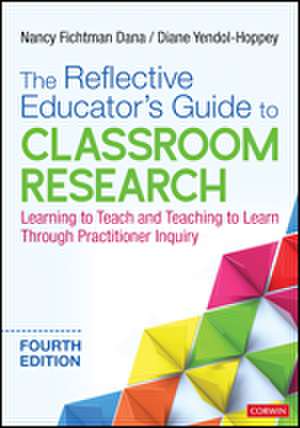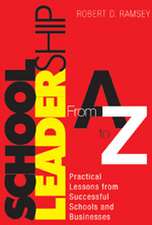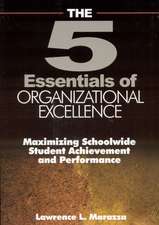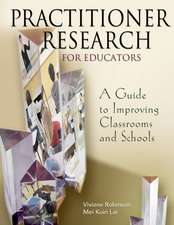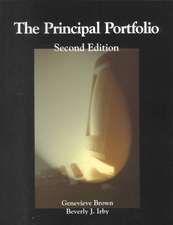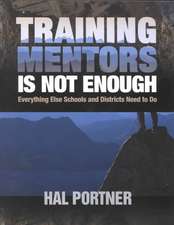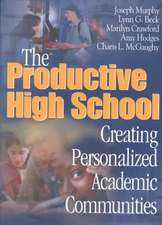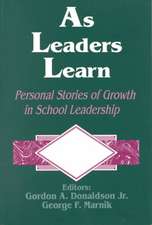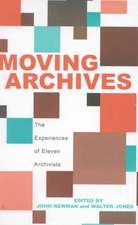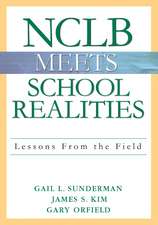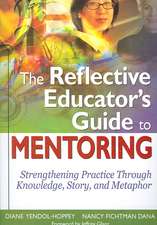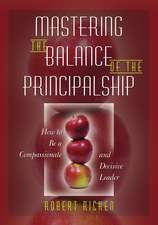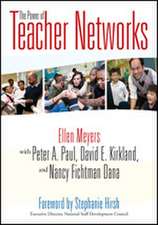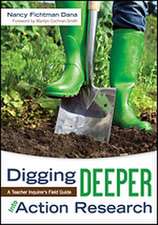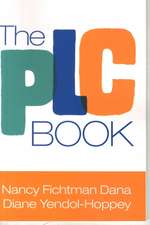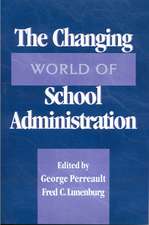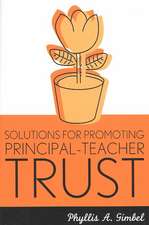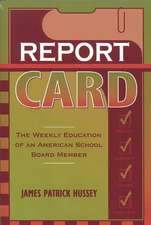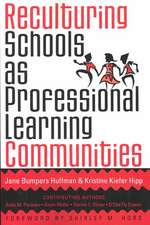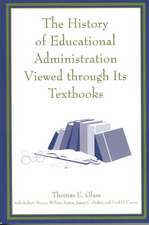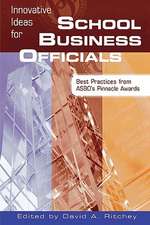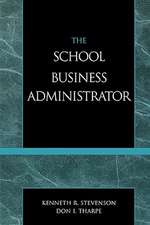The Reflective Educator's Guide to Classroom Research: Learning to Teach and Teaching to Learn Through Practitioner Inquiry
Autor Nancy Fichtman Dana, Diane Yendol-Hoppeyen Limba Engleză Paperback – 14 oct 2019
New to this edition:
• Clear links between teacher inquiry and the creation of more equitable classrooms.
• enhanced coverage of data analysis
• using teacher inquiry to promote collective efficacy
• the emergence of Professional Practice doctoral programs (a new market for Dana's work)
| Toate formatele și edițiile | Preț | Express |
|---|---|---|
| Paperback (2) | 140.00 lei 6-8 săpt. | +37.14 lei 6-12 zile |
| SAGE Publications – 14 oct 2019 | 303.10 lei 3-5 săpt. | +37.14 lei 6-12 zile |
| Corwin Press – 30 apr 2009 | 140.00 lei 6-8 săpt. |
Preț: 303.10 lei
Nou
58.00€ • 60.16$ • 48.36£
Carte disponibilă
Livrare economică 06-20 martie
Livrare express 19-25 februarie pentru 47.13 lei
Specificații
ISBN-10: 1544352182
Pagini: 352
Dimensiuni: 178 x 254 x 22 mm
Greutate: 0.73 kg
Ediția:Revizuită
Editura: SAGE Publications
Colecția Corwin
Locul publicării:Thousand Oaks, United States
Recenzii
“The Fourth Edition of The Reflective Educator's Guide to Classroom Research presents the crucial field of teacher research in an engaging and positive manner, with many explanatory examples and scenarios. True to its title, "reflective," the narrative highlights the importance of the qualitative approach to research in which the researcher looks at personal and experiential qualities that affect educational change.”
“This book makes a distinct contribution to the field by providing teachers with a step-by-step approach to teacher inquiry. It is also a great resource for teachers who want to conduct their own inquiries in schools. It is comprehensive, easy to read, and rich with examples and exercises that model the process of teacher inquiry for every stage.”
“Teacher inquiry is a catalyst for change, but the process can be intimidating. This text has a different feel to it. It is reflective in nature, which adds a personal touch to the research process. While it hits on all the same points as someone engaging in action research, the change to an inquiry stance reflects what teachers currently experience in their classrooms. Multiple examples throughout provide the support necessary and the text is useful for both an action research course and a teacher wishing to make systematic, deliberate improvements to his/her teaching. I highly recommend The Reflective Educator’s Guide to Classroom Research, 4E to anyone interested in using data to inform and strengthen their instruction and provide a more equitable classroom.”
“This book is a wonderful guide for teachers conducting research in their schools. It clearly explains the process and guides teacher researchers through with well thought out activities combined with ample rich examples to enhance understanding.”
“Stop and look no further: The Reflective Educator’s Guide to Classroom Research, 4E is the definite text on teacher inquiry. Inside these covers you will find answers to what teacher inquiry entails, why the inquiry process is vital to a healthy teaching profession, and how teachers can translate their wonderings into a systemic form of study that informs classroom change and improvement. Happy inquiring!”
Cuprins
About This Book
Acknowledgments
About the Authors
How to Use the Inquiry Books
Chapter 1. Teacher Inquiry Defined
What Is Teacher Inquiry?
What Is the Relationship Between Teacher Inquiry and Teacher Professional Growth?
What Evidence Exists That Teacher Inquiry Is Worth Doing?
How Is Teacher Inquiry Different From What I Already Do as a Reflective Teacher?
Why Inquire? Inquiry as a Pathway to Equity
What Are Some Contexts Ripe for Teacher Inquiry?
How Does My Engaging in Teacher Inquiry Help Shape the Profession of Teaching?
Chapter 2. The Start of Your Journey: Finding a Wondering
Where Do I Begin?
Where Do I Find My Wonderings and Questions?
What Happens If I Still Cannot Locate My Wondering?
Chapter 3. Learning With and From the Literature: The Importance of Reading
Why Read?
Where and How Do I Find Readings to Inform My Inquiry?
A Few Words of Literature Wisdom
Chapter 4. Learning With and From Your Colleagues: The Importance of Collaboration
Why Is Collaboration So Important?
What Are the Possibilities for How I Might Collaborate?
Chapter 5. Developing a Research Plan: Making Inquiry a Part of Your Teaching Practice
What Do Data Look Like, How Do I Collect Them, and How Do They Fit Into My Work as a Teacher?
When Do I Collect Data and How Much Do I Collect?
Chapter 6. Considering the Ethical Dimensions of Your Work as an Inquirer
What Should I Consider When Thinking About Ethics in Relation to Practitioner Research?
What Role Do School District Research Policies Play in the Inquiry Process?
What Role Do University Institutional Review Boards Play in the Inquiry Process?
Chapter 7. Finding Your Findings: Data Analysis
What Is Formative Data Analysis?
What Is Summative Data Analysis?
What Might Summative Analysis of Qualitative Data Look Like?
Chapter 8. Making Your Inquiry Public: Publishing and Presenting
Why Is It Important to Share My Work With Others?
How Do I Present My Work?
How Do I Write About My Work?
What Might My Writing Look Like?
Chapter 9. Contributing to the Creation of More Equitable Schools and Classrooms: The Why of Inquiry
Coming to View Inquiry as a Pathway to Equity: A Teacher Researcher’s Story (Mickey MacDonald)
Informing Thinking, Teaching, and Teacher Education: The Power of Equity-Focused Inquiry (Paige Bildstein, Mikhayla Kruse-Meek, Jillian Pohland, Nicole Snitkey, and Hilarie Welsh)
Chapter 10. On Your Way: Becoming the Best Teacher and Researcher You Can Be
What Is an Inquiry Stance?
Why Is It Important to Assess the Quality of My Work?
What Is the Difference Between Generalizability and Transferability?
How Do I Go About Assessing Teacher Research Quality and Why Is It So Difficult to Do?
What Are Some Quality Indicators for Teacher Research?
What Are Some Ways to Enhance Inquiry Quality?
Where Do I Go From Here?
References
Index
Notă biografică
Nancy Fichtman Dana is currently professor of education in the School of Teaching and Learning at the University of Florida, Gainesville. She began her career in education as an elementary school teacher in Hannibal Central Schools, New York. Since earning her PhD from Florida State University in 1991, she has been a passionate advocate for teacher inquiry and has worked extensively in supporting schools, districts and universities in implementing powerful programs of job-embedded professional development through inquiry across the United States and in several countries, including China, South Korea, Belgium, Portugal, The Netherlands, Slovenia, and Estonia. She has published ten books and over 100 articles in professional journals and edited books focused on her research exploring teacher and principal professional development and practitioner inquiry. Dana has received many honors, including the Association of Teacher Educator¿s Distinguished Research in Teacher Education Award and the National Staff Development Council (now Learning Forward) Book of the Year Award, both honoring Dana and Yendol-Hoppey¿s work related to practitioner inquiry.
